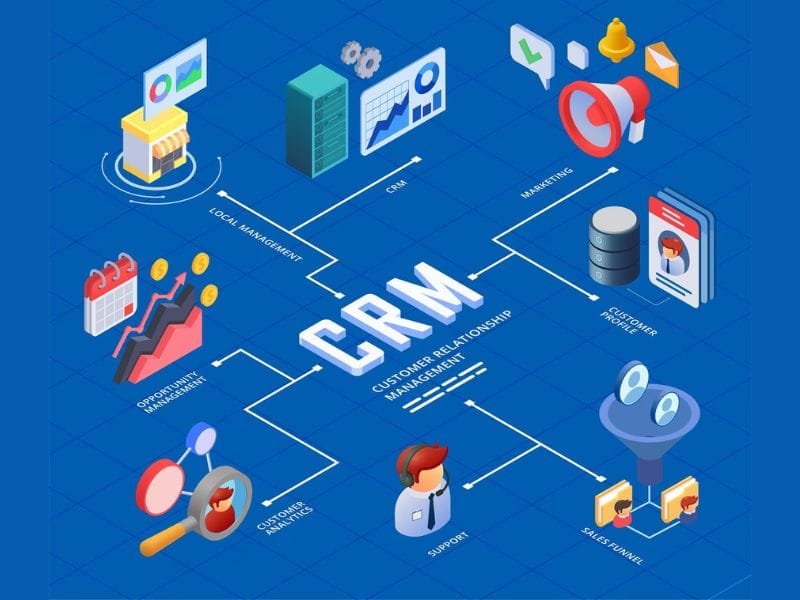In today’s era of rapidly advancing digital technology, effectively managing customer relationships has become a critical factor for the survival and success of every business. One of the key tools supporting this process is CRM. So, what is CRM exactly? Why is it so important? In this article, we will explore its definition, benefits, and practical applications in businesses.
What is CRM? A Basic Definition
CRM stands for Customer Relationship Management. According to Mailchimp, CRM is a process or technology that helps businesses manage interactions with both current and potential customers throughout their lifecycle. Simply put, CRM is not just software—it’s a strategy that enables businesses to build, improve, and maintain customer relationships by leveraging data.
CRM serves as a centralized hub for storing information, allowing businesses to collect, analyze, and utilize customer data to enhance user experiences, ultimately driving revenue and sustainable growth. Modern CRM systems often integrate features like contact management, marketing automation, data analytics, and sales support.
According to Grand View Research, the global CRM software market was valued at $48.7 billion in 2021 and is projected to grow at a CAGR of 14.6% from 2025 to 2030. This highlights CRM’s growing indispensability in business management.

Common Types of CRM Systems
To better understand what CRM is, let’s distinguish between the most common types of CRM systems, each serving a specific purpose:
- Operational CRM: This type focuses on automating sales, marketing, and customer service processes. For example, it helps manage lead lists, track customer purchase journeys, and provide post-sale support.
- Analytical CRM: This dives deep into customer data analysis to inform business decisions with actionable insights. It aids in predicting trends, optimizing marketing campaigns, and improving customer satisfaction.
- Collaborative CRM: This enhances coordination between departments (e.g., sales, marketing, and customer support) and even external partners to ensure a seamless customer experience.
Each CRM type has its strengths, and the right choice depends on a business’s specific needs.
Benefits of CRM for Businesses
So, why is CRM so vital? Here are the standout benefits it offers:
1. Efficient Customer Data Management
CRM acts as a centralized data repository, organizing everything from contact details and purchase histories to past interactions. Mailchimp notes that over 64% of businesses report that CRM tools significantly or greatly impact their operations due to effective data management.
For instance, when a customer reaches out via email or social media, support staff can instantly access their full transaction history, enabling quick and accurate responses. This saves time and boosts customer satisfaction.
2. Enhanced Sales Performance
According to Zendesk, CRM helps sales teams track customer buying journeys, personalize product recommendations, and evaluate sales performance. A WebFX report states that companies using CRM see a 17% increase in lead conversion rates and a 16% improvement in customer retention.
For example, STAjets, an aviation company, significantly improved its sales pipeline management after adopting Zendesk CRM, reducing potential lead loss from 10-20% to a minimal level.
3. Marketing Automation
CRM enables automation of marketing tasks like sending personalized emails, managing ad campaigns, and segmenting customers. Nutshell highlights that integrating CRM with marketing tools saves time and boosts campaign efficiency. HubSpot data shows that effective marketers are 46% more likely to use automation than those who don’t.
4. Improved Customer Service
SingleStone emphasizes that CRM enhances customer service quality by providing detailed insights into customer needs and behaviors. With comprehensive data, staff can resolve issues faster, increasing customer satisfaction.
5. Strengthened Internal Collaboration
CRM doesn’t just facilitate customer interactions—it also improves coordination between departments. For example, sales and marketing teams can share real-time data, leading to more cohesive and effective strategies.
6. Accurate Analysis and Forecasting
With built-in analytics, CRM helps businesses identify trends, predict customer behavior, and optimize strategies. A Nucleus Research study found that, on average, every dollar invested in CRM yields a $8.71 return, underscoring its exceptional value.
Practical Applications of CRM in Business

- Small Businesses: An online retailer uses CRM to track orders, send reminders for abandoned carts, and recommend products based on purchase history, boosting conversions and retention.
- Large Corporations: A multinational like Salesforce uses CRM to manage millions of global customers, integrating data from multiple channels (website, phone, email) for consistent service.
- Sales Teams: Sales reps use CRM to monitor each lead’s progress in the pipeline, focusing efforts on the most promising opportunities.
Why Do Businesses Need CRM?
In a fiercely competitive landscape, failing to adopt CRM could mean missing out on countless opportunities. Here’s why it’s indispensable:
- Improved Customer Experience: Today’s customers expect personalization and prompt service. CRM delivers this with detailed, timely insights.
- Revenue Growth: Nutshell reports that CRM adoption can increase sales by up to 29%, improve sales productivity by 34%, and enhance sales forecast accuracy by 42%.
- Cost Savings: Automating repetitive tasks reduces operational costs and boosts efficiency.
How to Choose the Right CRM System
To select a CRM that fits your business’s nature, size, and needs, consider these factors:
- Specific Needs: Determine whether your business requires CRM for sales, marketing, or customer service.
- Integration Capabilities: Ensure the CRM connects with existing tools like email, social media, or accounting software.
- Budget: CRM options range from free (e.g., HubSpot CRM) to premium (e.g., Salesforce). Pick one that aligns with your finances.
- Ease of Use: A user-friendly interface ensures your team can quickly adapt to the system.
Conclusion
In essence, CRM is more than just software—it’s a comprehensive strategy that empowers businesses to manage customer relationships effectively, driving growth and enhancing satisfaction. With benefits like centralized data management, improved sales performance, marketing automation, and better customer service, CRM proves its worth across all business sizes.
If you’re looking to optimize operations and build lasting customer relationships, investing in a CRM system is a step you can’t afford to skip. Start exploring the right CRM solutions with WBLGroup today to elevate your business to new heights!




